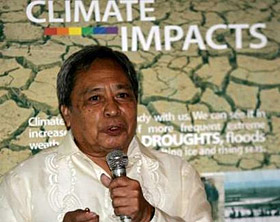 |
 |
 |
 Editorials | Environmental | November 2005 Editorials | Environmental | November 2005  
'Gas Muzzlers' Challenge Bush
 Roger Harrabin & Steve Hounslow - BBC News Roger Harrabin & Steve Hounslow - BBC News


| | Leoncio Amadore of the Philippines, member of World Meterological Association, discusses the impact of climate change in Southeast Asia during a Greenpeace news conference in Manila November 4, 2005. The conference is part of Greenpeace's 'Asia Energy Revolution Tour' around the region, campaigning from a massive shift from coal power and nuclear energy to cleaner, safer, renewable energy. (Reuters/Romeo Ranoco) |
President George W Bush is facing a rebellion over his softly-softly approach to climate change. Nine north-eastern states are poised to sign an agreement setting Kyoto-style legal limits on greenhouse gas emissions from power stations.

New York and New Jersey are among these rebel states. And in California, Governor Arnold Schwarzenegger is forging ahead with legislation to cut emissions from cars by 30% within a decade.

This could transform the motor industry.

Meanwhile, 187 mayors from US towns and cities, representing 40 million people, have pledged to adopt Kyoto targets for reducing greenhouse gases. Some leading American transnational firms are also demanding mandatory cuts in CO2 so that they are not isolated as the developed world moves towards a low-carbon economy.

It is all happening despite President Bush's outright rejection of the Kyoto climate protocol, which he said would cost American jobs.

'Intensity'

The Bush administration does now acknowledge that global warming is a problem, and that it is partly caused by human activity. Its strategy is to cut greenhouse gas "intensity" - jargon for cutting the amount of harmful gases produced for every unit of US economic output.

To achieve that, it is encouraging business to invest in low-carbon technologies like hydrogen cars. Not good enough, say the north-eastern states.

That is because under Mr Bush's plan, as the economy grows, the amount of greenhouse gases will grow too, albeit more slowly. Their Regional Greenhouse Gas Initiative (Reggie) gives power stations binding targets for cutting their CO2 emissions.

They can either do that by installing new cleaner technology, or by buying CO2 allowances from other companies who have cut their CO2 beyond the target. Carbon allowances thus become a tradable commodity, and there is money to be made for firms that clean up their act.

Economy

The states admit it will increase energy prices slightly at a bad time for consumers. And President Bush fears that putting a price on carbon will damage the economy. But the emissions trading system invented by the US to control sulphur has been used successfully for 15 years without great cost.

No-one is pretending that Reggie will quickly solve the problem of greenhouse gas emissions - its initial timetable and targets are modest.

But like Kyoto itself, the aim is to put a mechanism in place that can be built upon in the future.

In California they think they can be bolder. Republican Arnold Schwarzenegger is trying to force vehicle manufacturers to cut greenhouse gas emissions from their products by a third within a decade - not so much guiding the market as holding it in an arm-lock.

If the legislation survives legal challenges, other US states will follow California's lead, along with Japan and perhaps even China. No car manufacturer in the world will be able to ignore the requirement for lower CO2 emissions.

The "gas muzzlers" really will have made their point. | 
 | |
 |



